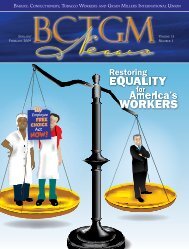BCTGM May-June 07.indd
BCTGM May-June 07.indd
BCTGM May-June 07.indd
You also want an ePaper? Increase the reach of your titles
YUMPU automatically turns print PDFs into web optimized ePapers that Google loves.
Shipping Jobs Overseas:<br />
How Real Is the Problem?<br />
From confectionery plants to textiles and auto<br />
manufacturing facilities, since 2001, the U.S.<br />
has lost more than 2.5 million manufacturing<br />
jobs and more than 850,000 professional service and<br />
information sector jobs. In Canada, the manufacturing<br />
sector is also in crisis. Since January, a total of 52,000<br />
manufacturing jobs have been lost, according to<br />
Statistics Canada’s monthly Labor Force Survey.<br />
No one knows for sure how many of these North American<br />
jobs have been lost due to increased import competition<br />
and shifts in production abroad, since no comprehensive<br />
official data are collected. But the number of jobs lost need<br />
not be overwhelming in order to concern policymakers:<br />
increased overseas outsourcing also undermines wages and<br />
working conditions in those jobs left behind and threatens<br />
the long-term health of the North American economy.<br />
How Many Jobs Have We Lost?<br />
What Are the Broader Impacts?<br />
• In the U.S., more than 3 million manufacturing jobs have disappeared<br />
since 1998, and the Economic Policy Institute estimates 59 percent — or 1.78<br />
million — of these jobs have been lost due to the explosion in the U.S. manufacturing<br />
trade defi cit over the period. In Canada, more than 250,000 manufacturing jobs<br />
have been lost since 2002.<br />
• From November 2002 to January 2004, the U.S. Department of Labor certifi ed<br />
246,398 workers who lost their jobs due to trade for Trade Adjustment<br />
Assistance (TAA). This is in addition to the estimated 1,112,775 workers who were<br />
certifi ed for TAA between 1994 and the end of 2002. The numbers do not include<br />
most service sector workers or workers who have lost their jobs due to shifts in<br />
production to China — neither group is eligible for TAA.<br />
• The Economic Policy Institute estimates that between 1993 and 2000, our lopsided<br />
trade policies, refl ected in the explosive increase in the U.S. trade defi cit, cost<br />
Americans a net 3 million jobs and job opportunities. The growth in the NAFTA<br />
trade defi cit alone is associated with nearly 900,000 lost jobs and job<br />
opportunities through 2002.<br />
• In Canada, job losses are closely linked to Canada’s soaring deficit in<br />
the trade of manufactured goods, and the increased penetration of the Canadian<br />
domestic market and the U.S. market for manufactured goods by exports from<br />
low-wage Asian countries.<br />
• Forrester Research Inc. predicts U.S. employers will move 3.4 million<br />
white-collar jobs and $136 billion in wages overseas by 2015.<br />
• In Canada, despite a growing workforce, the number of Canadians employed<br />
in manufacturing as fallen to its lowest level since January 1998. As a result,<br />
Canadians must make do with unstable, low-paid jobs in the<br />
service sector.<br />
• Economic theory predicts increased trade will<br />
lower wages for lesser-skilled occupations, and<br />
thus increase income inequality. Though<br />
economists’ estimates vary, increased trade is<br />
likely responsible for about 20 percent of the recent<br />
increase in income inequality in the U.S.<br />
• In the U.S., real wages have stagnated<br />
since 1973, even though productivity has<br />
grown rapidly.<br />
• The Economic Policy Institute reports wages in<br />
the industries in which jobs are being created are,<br />
on average, 21 percent lower than wages in<br />
those industries in which jobs are disappearing.<br />
In addition, expanding industries are less likely<br />
to provide workers with health insurance than<br />
industries cutting jobs.<br />
• Increased employer mobility also hurts workers<br />
by decreasing their bargaining power.<br />
As it becomes easier for companies to move work<br />
overseas, employers use the threat of sending work<br />
overseas to squelch union organizing drives and<br />
win concessions at the bargaining table.<br />
• Trade-related job loss does not just hurt<br />
individual workers and their families. Entire<br />
communities are affected negatively as tax<br />
revenues fall, dependency on public assistance<br />
increases, and incomes stagnate.<br />
8 <strong>BCTGM</strong> News
















